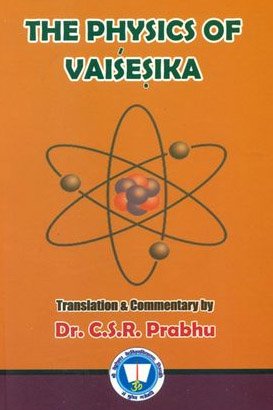Murtamurta, Mūrtāmūrta, Murta-amurta: 2 definitions
Introduction:
Murtamurta means something in Hinduism, Sanskrit, Jainism, Prakrit. If you want to know the exact meaning, history, etymology or English translation of this term then check out the descriptions on this page. Add your comment or reference to a book if you want to contribute to this summary article.
In Hinduism
Vaisheshika (school of philosophy)
Source: Shodhganga: A study of Nyāya-vaiśeṣika categories (vaisesika)Mūrtāmūrta (मूर्तामूर्त) or Mūrtāmūrtaguṇa refers to a classification of the twenty-four guṇas (qualities) according to the Vaiśeṣikadarśanam with Praśastapādabhāṣya and the Bhāṣāpariccheda.—Guṇas are also divided into mūrtaguṇa, amūrtaguṇa and mūrtāmūrtaguṇa. These divisions are found in the Praśastapādabhāṣya and also in the Bhāṣāpariccheda. Number, magnitude, distinctness, conjunction and disjunction are mūrtāmūrtaguṇas.

Vaisheshika (वैशेषिक, vaiśeṣika) refers to a school of orthodox Hindu philosophy (astika), drawing its subject-matter from the Upanishads. Vaisheshika deals with subjects such as logic, epistemology, philosophy and expounds concepts similar to Buddhism in nature
In Jainism
General definition (in Jainism)
Source: The University of Sydney: A study of the Twelve ReflectionsMūrtāmūrta (मूर्तामूर्त) refers to “matter and non-matter”, according to the 11th century Jñānārṇava, a treatise on Jain Yoga in roughly 2200 Sanskrit verses composed by Śubhacandra.—Accordingly, “[com.—Next he speaks about the connection of matter and non-matter (mūrtāmūrtasaṃbandham)]—In this world, the body which is material, absolutely immobile [and] without that which is conscious, becomes confused, through ignorance, with that which is conscious, formless and mobile. This corporeal body is produced from a mass of atoms. An embodied soul has the nature of enjoyment, is beyond the senses [and] consists of knowing”.

Jainism is an Indian religion of Dharma whose doctrine revolves around harmlessness (ahimsa) towards every living being. The two major branches (Digambara and Svetambara) of Jainism stimulate self-control (or, shramana, ‘self-reliance’) and spiritual development through a path of peace for the soul to progess to the ultimate goal.
See also (Relevant definitions)
Partial matches: Murta, Amurta.
Starts with: Murtamurtaguna.
Full-text: Murtamurtaguna.
Relevant text
Search found 2 books and stories containing Murtamurta, Mūrtāmūrta, Murta-amurta, Mūrta-amūrta; (plurals include: Murtamurtas, Mūrtāmūrtas, amurtas, amūrtas). You can also click to the full overview containing English textual excerpts. Below are direct links for the most relevant articles:
Taittiriya Upanishad Bhashya Vartika (by R. Balasubramanian)
Verse 2.410 < [Book 2 - Brahmavallī]
A History of Indian Philosophy Volume 5 (by Surendranath Dasgupta)
Part 5 - Śrīpati Paṇḍita’s Śrīkara-bhāṣya < [Chapter XXXVIII - Śaiva Philosophy in some of the Important texts]